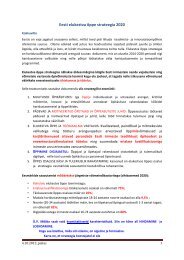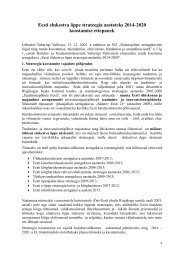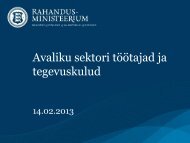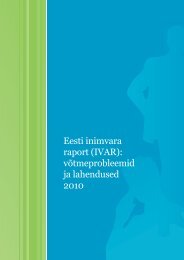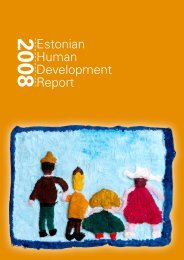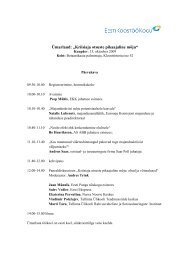DEVELOPMENT
The pdf-version - Eesti Koostöö Kogu
The pdf-version - Eesti Koostöö Kogu
Create successful ePaper yourself
Turn your PDF publications into a flip-book with our unique Google optimized e-Paper software.
Table 5.2.2<br />
Support of the different respondent groups for the measures that are necessary for coping with the impacts of globalisation<br />
(the position of the measure in the ranking is based on the percentage of supporters)<br />
Total sample,<br />
2013<br />
Economic<br />
policymakers,<br />
2013<br />
Economic<br />
policymakers,<br />
2000<br />
International cooperation for fighting crime 4 – 5 2 – 3 1 – 2<br />
Stricter rules to ensure the transparency of financial institutions 7 6 1 – 2<br />
Stronger supervision of the financial sector by<br />
the Bank of Estonia and the Financial Supervision Authority<br />
8 7 – 8 3 – 5<br />
Stronger industrial and technological policies 3 2 – 3 3 – 5<br />
Rising labour quality for coping in international competition 1 1 3 – 5<br />
International cooperation related to environmental protection 6 5 6<br />
International cooperation to prevent money laundering and banking-related crime 10 9 – 10 7<br />
Measures against abusing off-shore zones 12 11 8 – 9<br />
Maintaining of Estonia’s cultural identity 2 4 8 – 9<br />
Strengthening and better financing of the social protection system<br />
(helping people to cope with a crises)<br />
4 – 5 7 – 8 10<br />
Subsidising/supporting agriculture 9 12 11<br />
Protective measures to preserve jobs in Estonia 13 – 14 13 12<br />
Barriers to prevent unwanted immigration 13 - 14 14 *<br />
International cooperation to fight against diseases and epidemics 11 9 – 10 *<br />
*Measures indicated with a * were not included in the 2000 survey.<br />
If we compare the measures preferred by economic policymakers<br />
in 2000 with those in 2013, we see that the<br />
ones related to the financial sphere (overcoming banking<br />
problems) and fighting crime are not as topical any more.<br />
However, the importance of developing labour quality, and<br />
to a certain extent, also the development of industrial and<br />
technology policies, and the social protection system, as<br />
well as the preservation of cultural identity has increased.<br />
In the subsequent interpretation of measures, we<br />
have distributed the individual measures into three<br />
groups: 1) protectionist measures – measures to protect<br />
jobs, farmers’ subsidies, immigration barriers, also the<br />
possible reintroduction of the national currency and<br />
departure from the euro area; 2) measures to consolidate<br />
the economic environment; 3) measures related to<br />
development activities and international cooperation<br />
(see Table 5.2.3). We did not include the preservation of<br />
cultural identity and the strengthening of the social protection<br />
system as more universal aspirations in this classification;<br />
therefore in the following table, the columns<br />
showing the percentages of the supported measures do<br />
not add up to 100 percent.<br />
We see that support for the protectionist measures<br />
was quite limited, as was also true in the 2000<br />
survey. The measures related to economic development<br />
and international cooperation were mentioned most<br />
frequently by all the expert groups, whereas especially<br />
noteworthy was the strong support to these from the<br />
economic policymakers. Compared to the 2000 survey,<br />
the importance of consolidating the economic environment<br />
has decreased somewhat, in the opinion of the<br />
economic policymakers.<br />
Table 5.2.3<br />
The support of the elite groups for the different types of<br />
measures (support for the measures of the corresponding<br />
group among all the measures supported by the<br />
given elite group (%))<br />
Entrepreneurs<br />
Above, we placed each of the individual measures in<br />
one of three groups, based on what its main contribution<br />
seemed to be from the survey compilers’ viewpoints.<br />
However, in reality, the respondents’ views may<br />
differ somewhat from this grouping. In order to understand<br />
the perception of the measures and their connection<br />
by respondents we used cluster analysis 2 . Based<br />
on data clustering the measures were concentrated in<br />
clusters as to their “proximity” or “remoteness”. In the<br />
case of each cluster, we can speak about a “cluster forming<br />
measures”, around which the others converge. It is<br />
also possible to determine, which measures selected by<br />
Economic policymakers<br />
Politicians<br />
Cultural figures<br />
PhDs<br />
Economic policymakers,<br />
2000<br />
Protectionist measures 10 4 14 11 18 5<br />
Measures to consolidate the<br />
economic environment<br />
Development activities and<br />
international cooperation<br />
24 27 22 24 21 42<br />
48 52 44 42 40 47<br />
2 In the analysis, we used k-means cluster analysis.<br />
Estonian Human Development Report 2012/2013<br />
199



